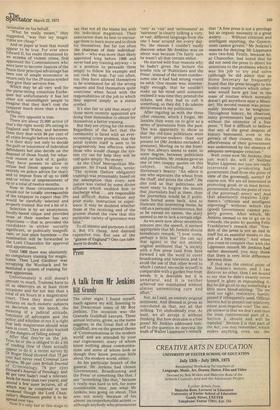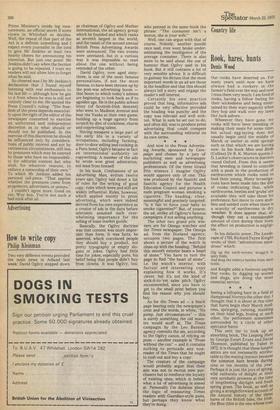Press
A talk from Mr Jenkins Bill Grundy
The other night I found myself, much against my will, listening to the Dwaconian tones of Mr Roy Jenkins. The occasion was the Granada Guildhall Lecture. These annual lectures, given, as the name suggests, in the Great Hall of the Guildhall, are on the general theme of 'Communications in the modern world' and are attended by your real cognoscenti, many of whom know nothing about communications and some of whom look as though they know precious little about the modern world, either.
As his particular branch of the general, Mr Jenkins had chosen 'Government, Broadcasting and the Press' or something like that. I say "something like that," because it really was hard to tell, for some considerable time, just what Mr Jenkins was going on about. This was not solely because of his almost incomprehensible accent — although anybody who pronounces 'very' as `vair' and 'seriousness' as `sairsness' is clearly talking a very, or vair, different language from the one I hear around me every day. No, the reason I couldn't easily discover what Mr Jenkins was on about was because I'm fairly sure he wasn't all that certain either.
He started with four reasons why he hadn't given the lecture the briefer title of 'Politicians and the Press', instead of the more cumbersome one it had had strung round its neck. One reason was, interestingly enough, that he couldn't make up his mind until someone realised it was time they printed the tickets, and they had to call it something, so they did. I do admire decisiveness in my politicians.
After regaling us with the three other reasons, which I forget, Mr Jenkins then went on to give us a series of quotations from the past. This was apparently to show us that the old-time politicians were better phrase-makers than our present lot (Mr Jenkins excluded, I presume). Moving on to the hostility that always seems to exist, to some degree, between politicians and journalists, Mr Jenkins gave us one or two snappy quotes on this subject, including Adiai Stevenson's beauty: "An editor is one who separates the wheat from the chaff, and prints the chaff." He also told us that politicians are more ready to forgive the insults that journalists hurl at them, than the journalists would be if politicians hurled some back. And to illustrate this interesting thesis, he told us a personal reminiscence, but as he named no names, the story seemed to me to lack a certain edge.
As we were now about seventeen minutes into the speech, it seemed appropriate that Mr Jenkins should hereabouts remark: "I now come, perhaps a little late" (he can say that again) to the not entirely original sentiment that "a society with a free press (and from here forward I use the word to cover broadcasting and television and to avoid the use of that other word to which I cannot reconcile myself) is comparable with a garden free from weeds. It is desirable but it is unnatural, and it is neither achieved nor maintained without almost unremitting care and effort."
Not, as I said, an entirely original sentiment. And dressed in prose as convoluted as that, not all that striking. Yet undoubtedly true. At least, we all accept it without thinking. But how desirable is a free press? Mr Jenkins addressed himself to the question by denying the truth of Walter Lippmann's remark that "A free press is not a privilege but an organic necessity in a great society.. . . Without criticism and intelligent reporting, the Government cannot govern." Mr Jenkins's reasons for denying Mr Lippmann were two-fold. Firstly, because he, as Chancellor, had noted that he did not need the press to direct his attentions to the problems which it was his job to try and solve (although he did admit that as Home Secretary he frequently found that the press brought to his notice many matters which otherwise would have got lost in the mass of routine which normally doesn't get anywhere near a Minister). His second reason was presumably intended to be weightier. Throughout history, he observed, many governments had governed without the existence of a free press: "I find it difficult to believe that any of the great despots of history bemoaned, even in the privacy of their closets, that the effectiveness of their government was undermined by the absence of adequate newspaper criticism."
Well, come now Mr Jenkins, that just won't do, will it? Neither Walter Lippman nor you are really interested in promoting bad government (bad from the point of view of the governed), surely? Of course not. We are all interested in promoting good, or at least better, government (from the point of view of the governed) aren't we? And that absolutely requires Lippmann's "criticism and intelligent reporting" without which the (good) Government cannot properly govern. After which, Mr Jenkins seemed to me to go on to concede, the point by quoting Felix Frankfurter's remark that "freedom of the press is not an end in itself but an essential means to the end of a free society." And when you come to compare that with the Lippmann remark Mr Jenkins had earlier dismissed, you may think that there is very little difference between them.
If that was the central point of Mr Jenkins's lecture, and I can discover no other, then I am bound to say that he didn't exactly cover himself in glory in expounding it. But he did go on to say something a little more blood-stirring: "Do we need our tight, restrictive, hastily passed if infrequently used, Official Secrets Act to protect our relatively minor post-imperial role? The simple answer is that we don't and thus the most controversial part of it, Section 2, should and will be repealed." Section 2 is that part of the Act, you may remember, which makes anything, even, say, the Prime Minister's inside leg measurement, an official secret if some clown in Whitehall so decides. Well, the repeal of that part of the Act is a definite something and I expect every journalist in the land to give Mr Jenkins at least two hearty cheers for announcing his intention. But just one point: Mr Jenkins didn't say when the Section is going to be repealed. I trust my readers will not allow him to forget what he said.
So cheered was I by Mr Jenkins's declaration that I found myself listening with real enthusiasm to his last bit — although how he got to it from where he was is still not entirely clear to me. He quoted the Press Council's ruling: "The freedom of the press depends essentially upon the right of the editor of the. newspaper concerned to exercise an unfettered and independent discretion as to what should or should not be published. In the exercise of this discretion he should be influenced only by considerations of public interest and not by extraneous circumstances, still less by pressures which may be exerted by those who have no responsibility for editorial content but who wish, for whatever reasons, to enforce a censorship of their own." To which Mr Jenkins added his personal tail-piece: "That applies whether the pressures come from proprietors, advertisers, or unions."
I couldn't agree more. Good on yer, Woy boy. You're not such a bad stick after all. ,



































 Previous page
Previous page